Crisp, juicy and refreshing, after you take your first bite, I think you'll agree Miner's lettuce (Claytonia perfoliata) is one of the best wild salad greens around. It's easy to identify and widely available, and there's just something about edible succulents. Read on and I'll introduce you to one of one of the most unique American plants I know.
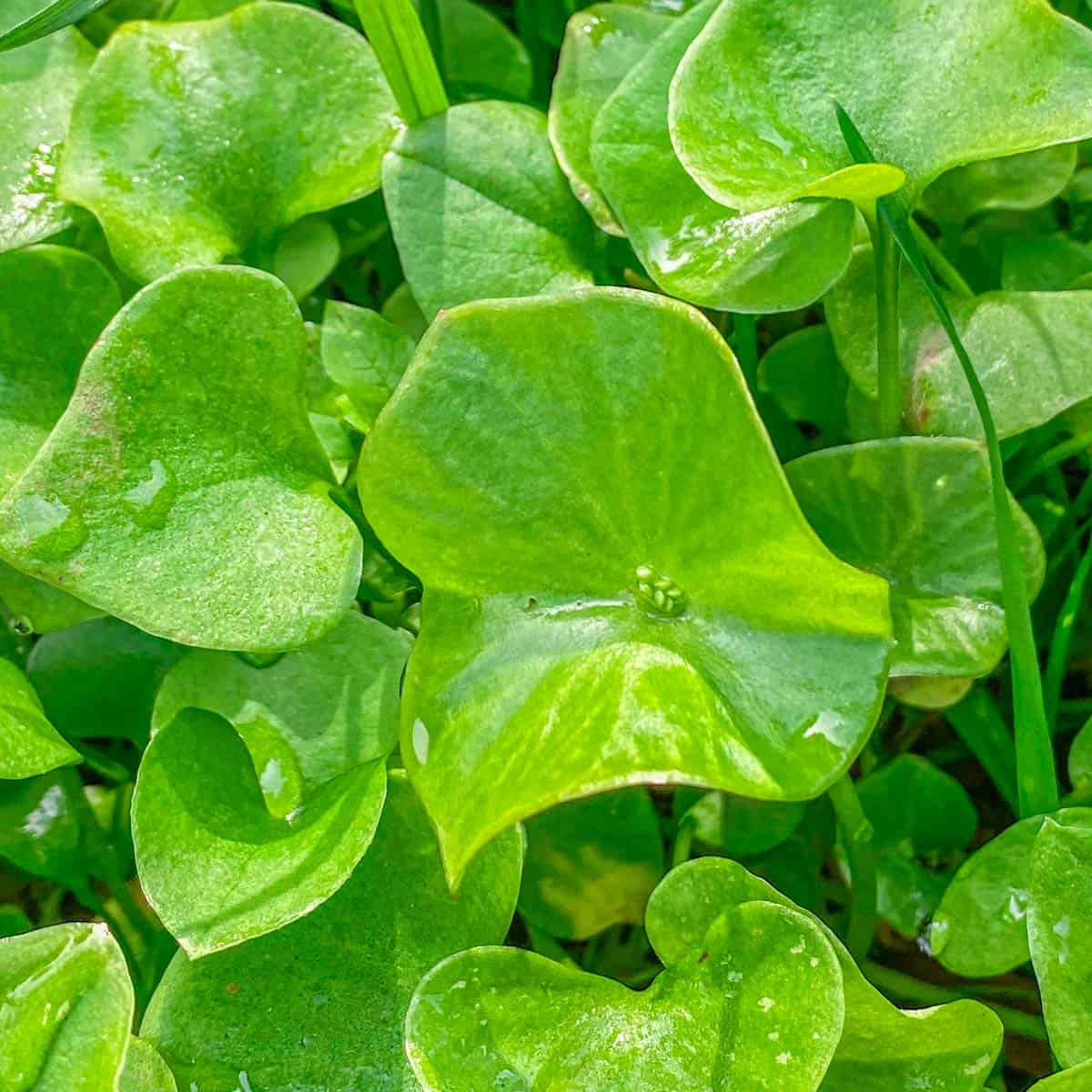
Background
Miners lettuce is a perennial succulent Native to the West Coast of North America. It's also known as winter purslane, and the outdated names Indian lettuce and Montia perfoliata. it's a common plant to see in the Early Spring in California and loves cool, moist growing conditions. I've even harvested it in February at high elevations in Arizona.
European explorers liked the plant so much they brought seeds home with them. Scottish Naturalist Archibald Menzies is often credited with it's arrival in England around the late 18th century. As perennials do, it eventually spread and is naturalized across Western Europe. Apparently the English liked the plant so much they went on to plant it in Cuba and Australia.
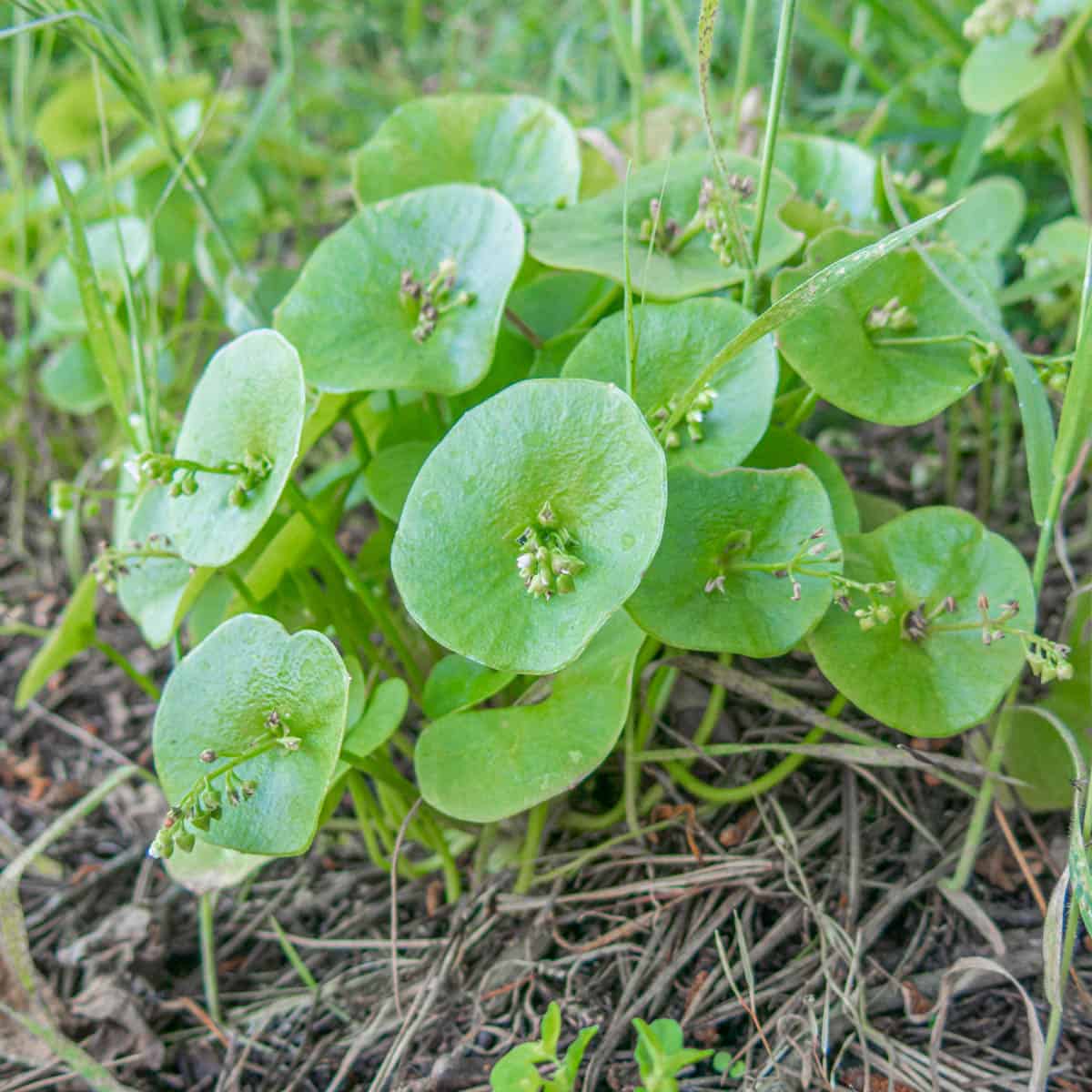
Miners Lettuce Uses
As the story goes, gold rush miners ate the plant and I'd wager they took a page from Native Americans in the region who've been eating it for a long time. Like many other traditional wild food plants, it‘s now often seen as another Spring weed.
According to Daniel E. Moerman, Native American tribes like the Ohlone and others from Northern California up to British Columbia used the plant and other Claytonia lettuces as food.
Miners lettuce is a good source of vitamins. According to a study in the Journal of the American Dietetic Association, just 100 grams of miner's lettuce (a dinner-plate full) contains a third of your daily vitamin C, 10 percent of iron, and 22 percent of vitamin A.
Miners lettuce is a good source of vitamin C, and its use as a medicinal plant to prevent scurvy, is well documented. The same is true with spruce tips.
Miners Lettuce Identification
A great plant for beginning foragers, Miners lettuce, as well as all of it's relatives in the genus Montia are edible. I don't know any miners lettuce look alikes, and the unique shape of its leaves that resemble saucers or cups makes it easy to spot once you get to know it.
The only tricky part of identifying miners lettuce for me was that the leaves change shape over time. The leaves are bright green and heart-shaped when young, but turn cup-shaped as the plant grows. At maturity each rounded leaf will have clusters of small white flowers, or occasionally, slightly pink flowers.
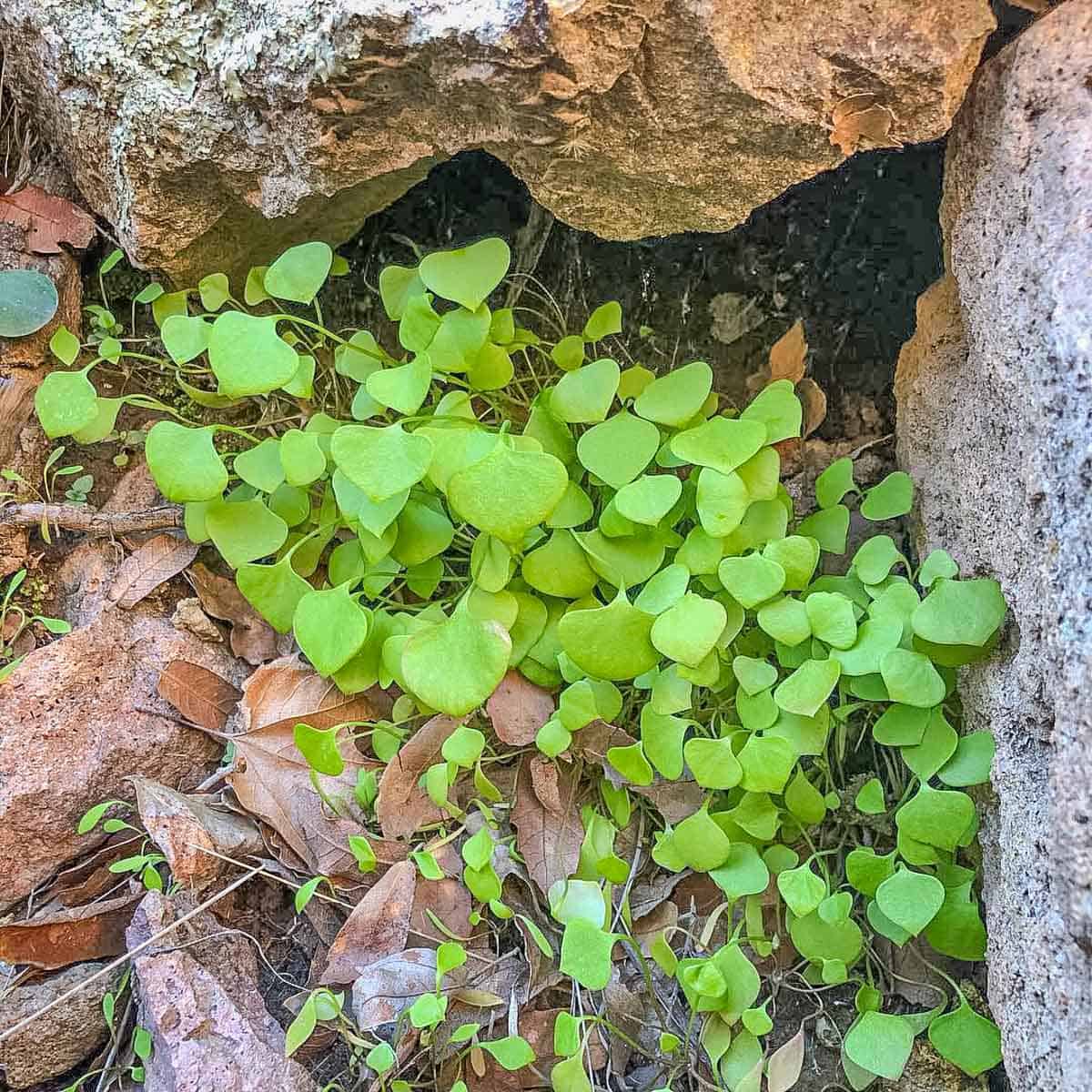
If the plants dry out, the leaves can turn blush to light red. Its usually a small plant, but stems as long as 12 inches are possible.
Every time I go to San Francisco and the Bay Area in the Spring I'm surprised by how I see miners lettuce growing everywhere. The clusters of cup-shaped leaves connected to the base of the plant by long petioles (stems) are hard to miss.
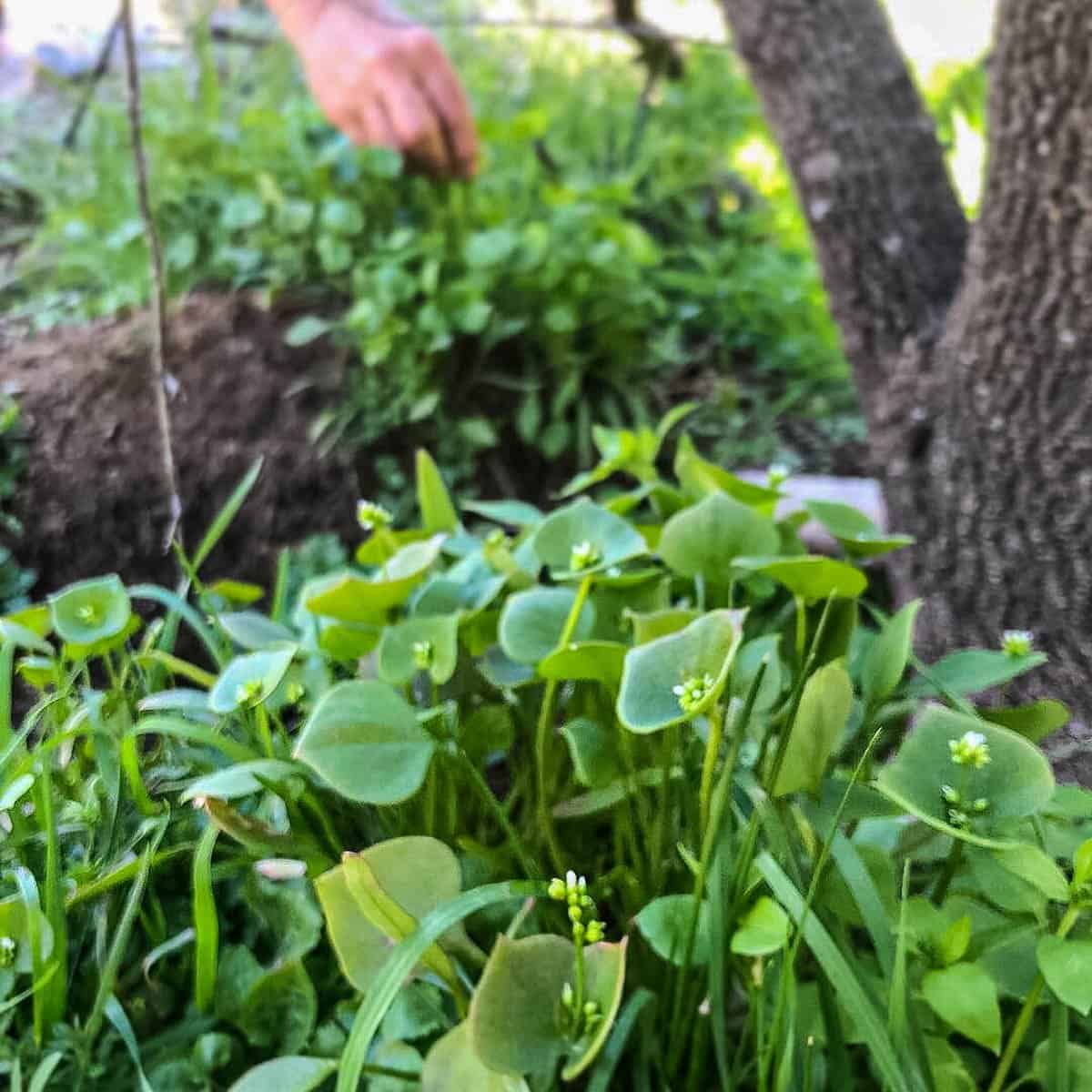
If you live on the West Coast or a place without brutal winters like Kentucky, miners lettuce will be easy to propagate and there's plenty of places that sell miners lettuce seed. As a perennial, it may spread given the chance.
There's a few people I know that grow miners lettuce in the Midwest. None have succeeded in getting it to survive our Winters yet, so they have to plant it as an annual. Thankfully we have a cousin in the Midwest in Spring Beauty (Claytonia virginica)-another delicious wild salad green with a similarly succulent, juicy texture.
Different Species
The most common miners lettuce is C. perfoliata, but there's many different species including rare varieties like the alpine spring beauty (C. megarhiza) I sampled with Erica of Wild Food Girl.
If you're a chef and want to buy miners lettuce, my friend Mushroom Mike LLC sells it, as well as Foods in Season. Red-stemmed spring beauty (C. rubra) is the most common species sold to restaurants and usually costs about $15-20 per pound. Every variety I've had has been great, and Ive never eaten one with the bad aftertaste reported in some accounts.
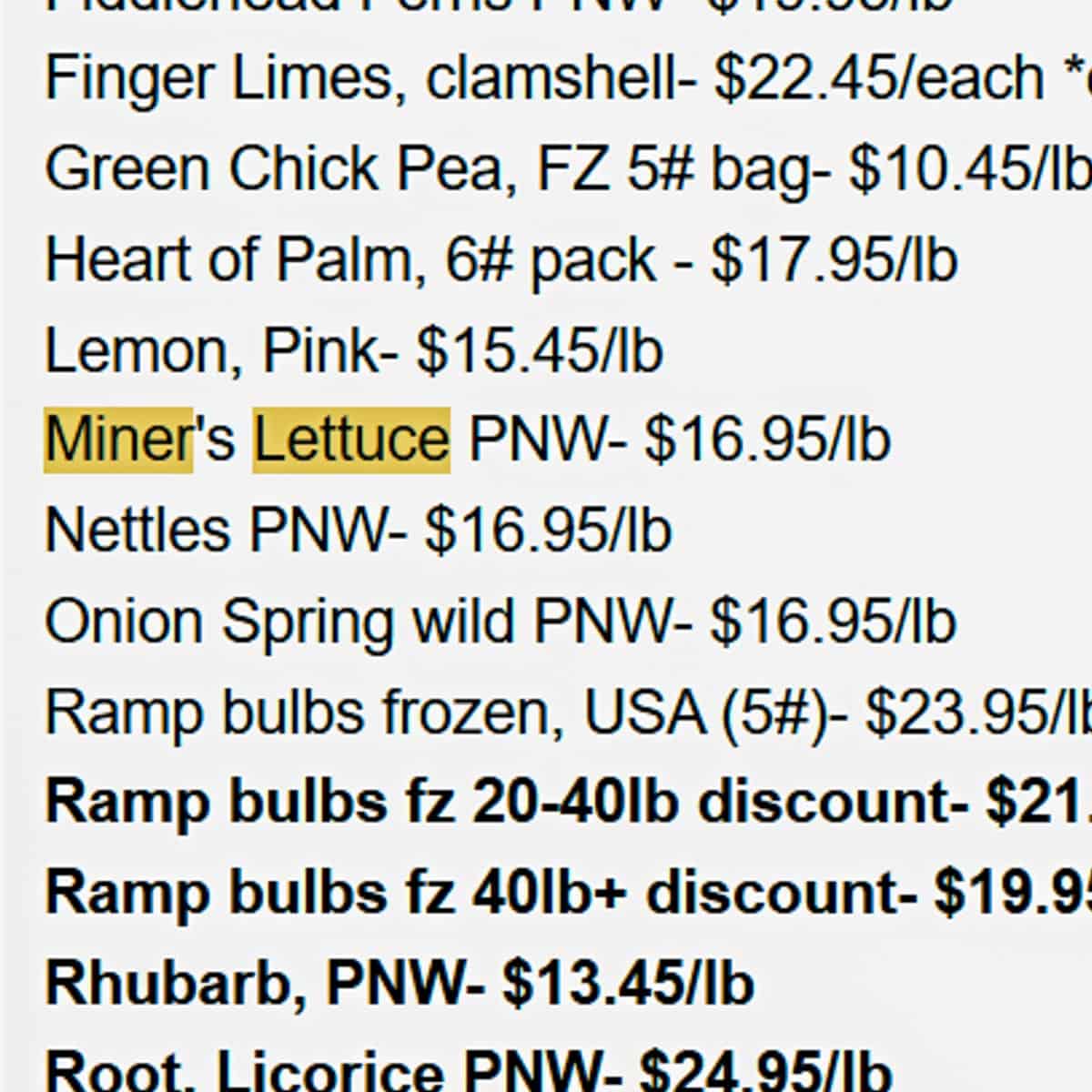
I think if more people knew how much chefs pay for miners lettuce they might think differently when they see it growing through a crack in the sidewalk, wouldn't you agree?
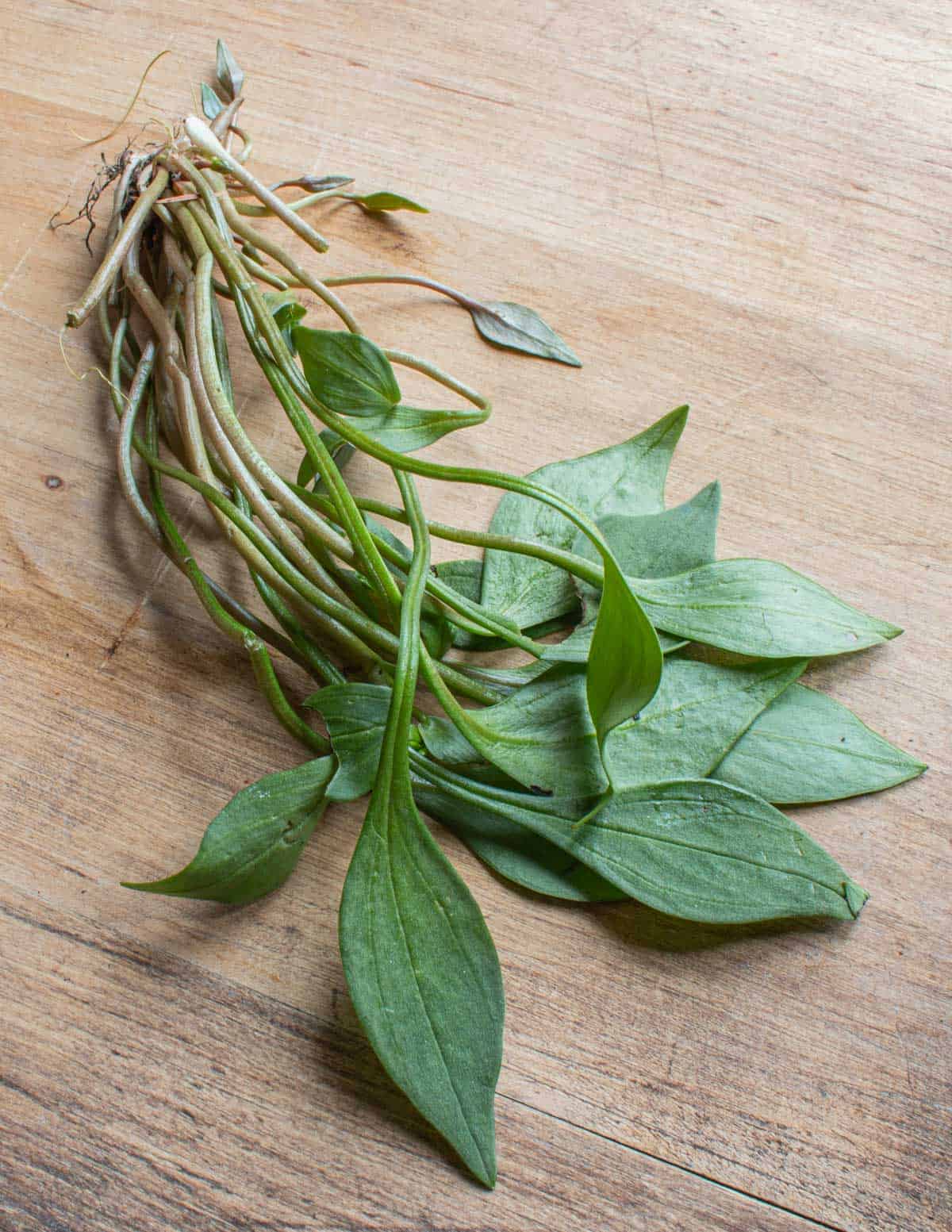
Eating Miners Lettuce
Miner's lettuce tastes fresh and clean. Some compare the taste to spinach but I think purslane crossed with lettuce is a better comparison. As it tastes so good raw I think cooking miners lettuce, unless you have a very large amount, would be a waste.
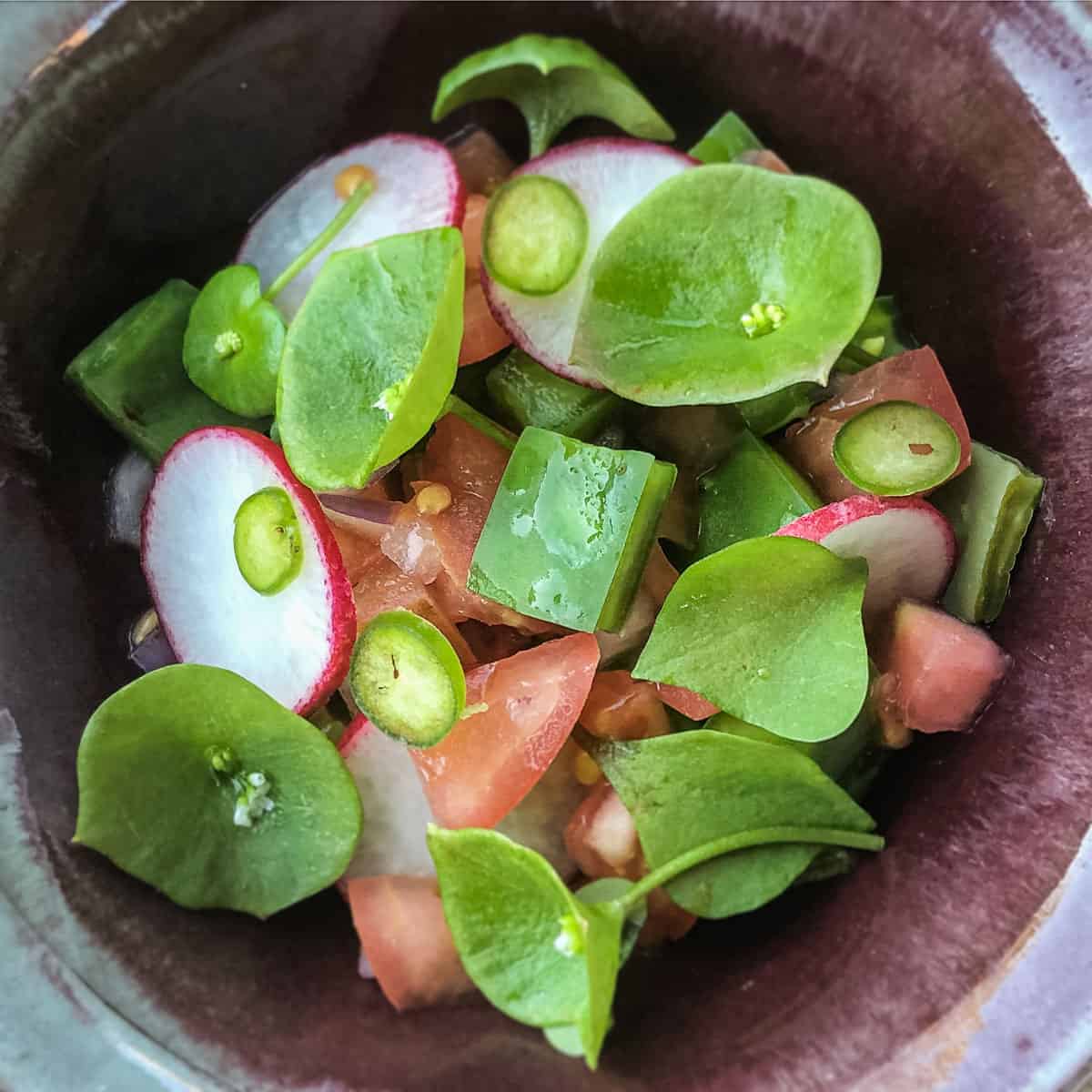
I love to eat the crisp, juicy greens by the handful on hikes, raw in salad, lightly dressed with a vinaigrette, or sprinkled on plates as a garnish.
Treat it as simply as possible and you’ll be rewarded with one of the greatest salad greens there is, and a meal that’s uniquely American.
References
Daniel E. Meorman Native American Food Plants
Archibald Menzies Menzies' Journal of Vancouver's Voyage, April to October, 1792

mike
I got to know it hiking in the Olympic National Park back in the 70s, when I was dirt poor but would still go out into the back country for weeks at a time, usually without a stove or adequate food. I forget how I first learned to identify it, but it's not hard.
Diane in Sunnyvale, CA
I just found your article about miner's lettuce. It grew wild about five years ago. in the north side of my house and I wasn't sure what it was. I have tons of climbing nasturtiums that look identical in their leaves except for the delicate tiny flowers of the lettuce. It only lasts for a few weeks then disappears. Can I pick the seeds while green before the seem to dry and blow away in a few dry days?
Alan Bergo
Hi Diane, you could try that, but I think a better option would be to tie something around the seeds that can catch them as they dry, like a bag. It can be hard to catch them, but if they're in your yard it's also pretty easy to just check them each afternoon and gather mature seeds.
Melanie
Writing from Central New Zealand here! Buckets of miners lettuce come up in our vege garden every winter, eventually going to seed in the spring. It provides us with daily fresh salads all winter long and has a milder taste than many other winter greens. I have never cooked it but am about to add some to a stirfry as there is barely anything else left in our early spring vege garden.
JacqBrisbane
Sub-Tropical Queensland checking in!
I have a small patch of miner's lettuce growing in what is considered winter here. Sown in June, it's probably ready to start picking now, 01 September, the first day of our short Spring. No sign of flowering yet.
I wonder if I could preserve some in oil, as a nuttless pesto, which I do for chickweed and dandelion? Or is it too delicate for this? TIA.
Alan Bergo
IMO it's best fresh. The flavor is delicate and the lack of bitterness is so nice. I know lots of people make pesto from things other than herbs, but if it doesn't have a strong flavor like arugula, hot mustards, dandelions I would just enjoy them in their pure form.
Ashley
I live in the idaho panhandle, the hillside on my property is covered in miners lettuce. I had no idea what it was, i enjoy the greenery and my kids pick the flowers but now i think ill eat some thanks.
Alan Bergo
Enjoy your free gourmet greens. I've been craving them. A few years ago I ordered some for a special dinner and I paid 20 $ a lb.
Jeri Miller
Loved your article! We live in the mountains and minerslettuce comes up every year in our small garden. So good! Wish I had more people to share it with as our kids and grandkids disdain it! So hubby and I feast a few weeks til the next year. It is a visual delight to watch the stuff grow! Life up here in the 1800’s was so harsh, maybe miners lettuce was a source of encouragement as well as good nutrition!! So darn good!
Norm in SF
WOW~
We live in San Francisco and our small back yard has been vigorously overgrown with what I just discovered is a great salad plant!!
It's the only thing that competes with crabgrass, and both have been going into the compost bin. Fortunately I have not sprayed weed killer since they appeared.
Going outside now to harvest. Maybe I'll even plant a crop.
THANK YOU for this article!
Now, it would be wonderful to know that those tiny plants with daisy-like flowers are edible. (Still entertaining no hope for crabgrass having a useful purpose.)
Alan Bergo
Ha. Good luck finding a use for crabgrass! I'm jealous of anyone who has miners lettuce in their backyard--the stuff is one of my favorites and it has to be planted as an annual in MN and WI. Good on you, and enjoy those delicious salads! A
Norm in SF
Alan, thanks for the appreciation.
As you are a connoisseur, would you have any advice, e.g., harvest them older or younger; any special recipes that MiNers and WI lettuce fans have invented?
As for crabgrass, my last-ditch desperation stratagem is to make their roots, somehow, tasty but lethal to the invasion of gophers I've suffered. Hey, the gophers aren't bothering my miner's lettuce; is there a cure here? But maybe I am asking the wrong part of the country: isn't there a team calling itself the golden gophers near you? Perhaps for gopher control I am barking down the wrong hole.
But our winter (rainy) is our growing season. Perhaps there's a way to ship our crop to you for Thanksgiving?
Thanks again!
Alan Bergo
Well, miners lettuce is super forgiving, and unlike alot of other plants I don't detect a lot of difference during the year as it grows, where many plants get very tough and fibrous. If I had a whole bunch, I'd probably cook some, but as it's such a delicious salad green, I'd probably just stick to simple treatments like lemon and oil.
As far as gophers, I'd suspect they like peanut butter put in a trap. I eat woodchucks, snapping turtles, and all kinds of nuisance animals here, so I'd probably catch them and eat the buggers. Let me know if you need a recipe--my woodchuck stew would work well. Small herbivores are delicious.
Cynthia Winstead
I live on the Central coast in California and while walking my dog about 5 miles inland in a rural area I noticed these little clumps of wild begonia-looking plants. So I took a couple of pictures and pulled up about 8 clumps to see if they would grow in pots. After googling the picture I took I find out they're not begonias, but actually lettuce! Now instead of growing as an ornamental, I'll be growing food. I need to research this, but does anyone have some did & donts to pass on?
Alan Bergo
Don't eat it growing from the side of the road or areas that have been sprayed. I'm jealous! Miners lettuce is sooo good, but it has to be planted as an annual where I live. Know that it's a self seeding perennial where you are, so be prepared for it to "make itself at home". It's a wonderful food plant.